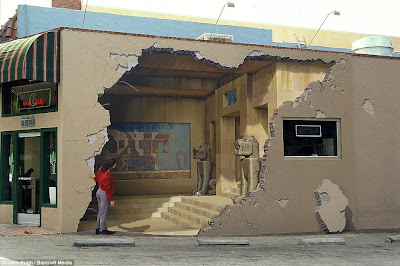 John Pugh’s Mana Nalu mural in Honolulu. Fire crews rushed to save the children from the mighty wave - before realising it was an optical illusion.
John Pugh’s Mana Nalu mural in Honolulu. Fire crews rushed to save the children from the mighty wave - before realising it was an optical illusion. John inserts a passer-by into the mural painted in Santa Cruz, California, entitled Bay in a Bottle, who is watching the ocean scene.
John inserts a passer-by into the mural painted in Santa Cruz, California, entitled Bay in a Bottle, who is watching the ocean scene. Valentine’s Day, a mural unveiled during the Global Mural Conference in Twentynine Palms, California.
Valentine’s Day, a mural unveiled during the Global Mural Conference in Twentynine Palms, California. A mural entitled Art Imitating Life, at the Cafe Trompe L’oeil, in San Jose, California.
A mural entitled Art Imitating Life, at the Cafe Trompe L’oeil, in San Jose, California. An Egyptian style mural adorns a wall in Los Gatos, California. Pugh paints people into the mural to heighten the 3D effect.
An Egyptian style mural adorns a wall in Los Gatos, California. Pugh paints people into the mural to heighten the 3D effect. This looks like a nice spot to rest your weary feet on a sidewalk in Sarasota County Health Center, Florida.
This looks like a nice spot to rest your weary feet on a sidewalk in Sarasota County Health Center, Florida. Greek tragedy: But the Doric-style columns apparently exposed in this university hall are nothing but paint.
Greek tragedy: But the Doric-style columns apparently exposed in this university hall are nothing but paint.





































John about himself:
I am a trompe l’oeil artist focusing primarily on mural painting. I have found that the “language” of life-size illusions allow me to communicate with a very large audience. It seems almost universal that people take delight in being visually tricked. Once captivated by the illusion, the viewer is lured to cross an artistic threshold and thus seduced into exploring the concept of the piece. I have also found that by creating architectural illusion that integrates with the existing environment both optically and aesthetically, the art transcends the “separateness” that public art sometimes produces.
It is important for me, as an artist, to interact with the community, formulating concepts based upon a multitude of viewpoints. Artists must be continually aware that their work can serve as a bridge between diverse cultural backgrounds. Public art is of great interest to me; providing me with a sense of purpose as it is a very powerful form of communication. It can link people together, stimulate a sense of pride within the community, and introduce the viewer to new ideas and perspectives.
When developing a mural, I also respond to aspects of the location such as its architectural style or the natural surroundings. Often, I like to play with the art’s context by contrasting these environments with another place and/or time. This paradox or juxtaposition of environments transports the viewer on a journey from local reality into a new space. During this “voyage”, the viewer may experience sequential discoveries as my compositions are designed to unfold in narrative layers.
While most of the time I respond to existing architectural settings, I have also had the opportunity to take part in the development of the architecture itself; modifying the design of the structure to marry the painting to the site. This bridge between art and the architectural can effectively erase the transition point between reality and illusion. The art thus becomes integrated into the real world of architecture and lends credibility to the illusion of the painting. Together the sum is greater than its parts.
Source: dailymail